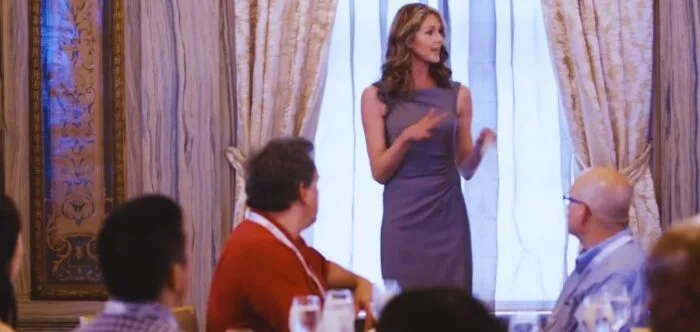At a conference, the smooth execution and engaging atmosphere you experience largely depend on the precise work of a Conference Manager. Now you may ask, what does a conference manager do?
The conference manager is responsible for managing the entire conference lifecycle. This includes selecting the right venue, careful budgeting, exact scheduling, and coordinating speakers. They also manage attendee registration, ensuring a smooth process for participants.
Their role is essential in ensuring the event runs smoothly, tackling any challenges that arise with poise and efficiency. If you’re curious about the details of this role and how Conference Managers create successful events, stay with us as we explore more in the upcoming sections of this article.
Who are the Conference Managers?
Conference managers are professionals responsible for overseeing and coordinating various aspects of a conference to ensure seamless execution. They handle everything from venue selection to speaker arrangements, making sure the event meets its objectives. Their expertise helps create a well-organized and engaging experience for attendees, speakers, and sponsors alike.
Many countries, such as the United States, Germany, and Canada, host large-scale events that bring industry leaders together. Organizing an international conference in Canada requires conference managers to handle logistics, scheduling, and participant coordination with precision. They work closely with different teams to ensure every detail aligns with the conference’s goals and enhances its impact.
Beyond planning, conference managers focus on making an event memorable by ensuring smooth operations. They anticipate challenges, make quick decisions, and find solutions to unexpected issues. Their dedication plays a crucial role in creating a professional and enjoyable experience for everyone involved.
What Does a Conference Manager Do?
The role of a conference manager is crucial to ensuring a successful event. They handle various aspects of planning, organizing, and executing the event. Recognizing conference manager responsibilities is essential for grasping their importance in creating smooth and engaging conferences. The following are some of the tasks that a conference manager performs:
Initial Planning and Conceptualization
- A Conference Manager starts by conceptualizing the event’s theme and objectives.
- They collaborate with clients or stakeholders to align the event’s vision and goals.
- Budgeting forms a major part of this stage, ensuring financial feasibility.
- Venue selection is tailored to match the event’s scale and audience.
Coordination and Communication
- Coordinating with different teams is a daily task for Conference Managers.
- They ensure all parties, from caterers to tech support, are on the same page.
- Effective communication skills are vital to relay information clearly and promptly.
- They also manage negotiations with vendors, securing the best deals.
Logistics Management
- Managing logistics is a cornerstone of a Conference Manager’s duties.
- They handle everything from travel arrangements to accommodation for attendees.
- Ensuring the availability of necessary equipment falls under their purview.
- They create a detailed schedule, mapping out each segment of the conference.
On-site Management
- During the event, they are the go-to person for resolving issues.
- They supervise the event, ensuring everything runs as planned.
- Addressing any unforeseen challenges quickly is part of their role.
- They are constantly on their feet, overseeing the event’s flow.
Post-Conference Activities
- After the event, their work is far from over.
- They gather feedback to assess the event’s success and areas for improvement.
- Managing the cleanup and disassembly of the venue is their responsibility.
- They also handle post-event communication with attendees and stakeholders.
A conference Manager is the backbone that holds a successful conference together. They manage numerous tasks, ensuring the event not only meets but exceeds expectations.
Required Qualifications to Become a Conference Moderator
Starting a career as a Conference Manager requires a unique set of qualifications. These not only include educational backgrounds but also specific skills that are key in this field. Let’s explore what it takes to excel in this dynamic role.
- Educational Background: A degree in event management, hospitality, or a related field is often preferred. This provides a foundational understanding of the industry.
- Organizational Skills: Being highly organized is essential. Conference Managers must juggle various tasks efficiently and effectively.
- Communication Abilities: Excellent communication skills are key. They must articulate ideas clearly and negotiate with vendors and speakers.
- Problem-Solving Aptitude: They should be adept at solving problems quickly and creatively. Challenges in event planning are frequent and varied.
- Attention to Detail: A keen eye for detail ensures no aspect of the conference is overlooked. This skill is vital for event success.
- Leadership Qualities: Strong leadership skills are necessary to guide teams and make decisive decisions. They lead the event from planning to execution.
What are the Steps to Becoming a Conference Manager?
Becoming a conference manager can be an exciting career choice if you enjoy organizing events. Whether it’s corporate conferences, academic symposiums, or industry conventions, this role demands a specific set of skills. In this simple step-by-step guide, we’ll break down the essential steps to help you start your journey as a successful conference manager.
Step 1: Obtain a Relevant Educational Background
To embark on a career as a conference manager, start by pursuing a bachelor’s degree in fields such as event management, hospitality, or business administration. This foundational education will provide you with the essential knowledge and skills required for the role.
Step 2: Gain Practical Experience through Internships
Secure internships or entry-level positions in event planning or management. Practical experience will expose you to the intricacies of organizing conferences and help you develop major event coordination skills.
Step 3: Develop Strong Communication and Networking Skills
Conference managers often interact with various stakeholders, including clients, vendors, attendees, and conference committees. Understanding conference committee functions is crucial for effective collaboration. Developing these skills ensures you can build strong relationships and coordinate smoothly.
Step 4: Acquire Technical Proficiency
Familiarize yourself with event management software and tools. Proficiency in these technologies will streamline conference planning tasks, from registration and scheduling to budgeting and marketing.
Step 5: Build a Portfolio
Compile a portfolio showcasing your past event management projects. This visual representation of your capabilities will help you attract potential clients or employers.
Step 6: Seek Professional Certifications
Consider pursuing industry-specific certifications, such as the Certified Meeting Professional (CMP) designation. These credentials can enhance your credibility and open up more opportunities in the field.
Step 7: Apply for Conference Manager Positions
Search for conference manager positions at event management companies, corporations, or as a freelance event planner. Tailor your resume and cover letter to highlight your qualifications and experience, and prepare for interviews to secure your desired role in conference management.
By following these steps and staying committed, you can build a successful career in conference management. Each step you take brings you closer to creating memorable and impactful events that leave lasting impressions on attendees.
Benefits of Being a Manager at a Conference
Being a manager at a conference offers a multitude of advantages that go beyond the role’s responsibilities. It’s a dynamic and fulfilling position that can significantly impact your career and personal growth. Let’s explore the benefits of being a conference manager.
Diverse Skill Development
As a conference manager, you’ll hone a wide range of skills, from project management and communication to problem-solving and negotiation. These versatile skills are transferable to various roles and industries, enhancing your career prospects.
Networking Opportunities
Managing conferences provides unparalleled networking opportunities. You’ll interact with industry leaders, speakers, sponsors, and attendees, raising valuable connections that can lead to career advancements or collaborations in the future.
Enhanced Leadership Skills
Conference management often involves leading teams and making key decisions. Overseeing conference coordinator duties is also a key aspect of this role, ensuring that every detail is managed effectively. This experience allows you to develop and refine your leadership abilities, which can boost your confidence and effectiveness in any leadership position.
Exposure to Industry Trends
Staying updated with the latest industry trends is important for success. As a conference manager, you’ll have front-row access to emerging topics, technologies, and best practices, ensuring your knowledge remains current and relevant.
Career Advancement
Experience as a conference manager can open doors to higher-paying roles and increased responsibilities. Your demonstrated ability to handle complex events can make you a valuable asset to employers seeking skilled professionals.
Creativity and Innovation
Conference management encourages creativity and innovation. From designing engaging agendas to finding unique solutions to challenges, you’ll have the chance to showcase your creative thinking, which can set you apart in your career.
Personal Satisfaction
The sense of accomplishment from successfully executing a conference is immensely gratifying. Knowing that your efforts contributed to a memorable and productive event can provide a deep sense of personal satisfaction and fulfillment.
Being a conference manager offers numerous advantages, including skill development, networking opportunities, leadership growth, exposure to industry trends, career advancement, creativity, and personal satisfaction. This role is not just about coordinating events; it’s a gateway to a fulfilling and impactful career.
Wrap Up
The role of a conference manager is crucial to ensuring the smooth execution and success of any event. Their responsibilities involve everything from planning and budgeting to coordinating logistics and solving on-site challenges.
When considering “What Does a Conference Manager Do?” it’s clear that their expertise is essential in creating a smooth and engaging experience for attendees.
By mastering multiple skills and taking on leadership roles, conference managers contribute significantly to the overall success of conferences. This makes their role extremely important in the event industry.








